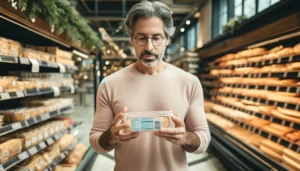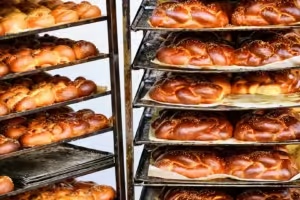Kosher Certified: A Gateway to Expanding Markets
In today’s dynamic food market, companies across all sectors, especially those in commercial baking and grocery, recognize the essential role of adapting to consumer demands. Kosher certified products, such as Keto PowerFlax Baking Mix, not only meet these demands but also broaden market opportunities significantly by appealing to a diverse consumer base searching for kosher options.
Understanding Kosher Certification– More Than Just a Dietary Law
Kosher foods adhere strictly to kashrut, the Jewish dietary laws detailing permissible foods and their preparation methods. To gain kosher certification, every ingredient, additive, and every step of the production process must comply with these laws. This rigorous standard underscores a commitment to quality and purity, attracting not only Jewish consumers but also non-Jewish shoppers who perceive kosher products as safer and of superior quality.
This rigorous standard attracts not only Jewish consumers but also non-Jewish shoppers who perceive kosher products as safer and of superior quality.
The Expanding Kosher Certified Market in the U.S.
The U.S. kosher market is thriving and expanding rapidly, valued at approximately $42.64 billion with projections to reach $78.55 billion by 2033, growing annually at 6.3%. This growth mirrors the increasing consumer interest that extends well beyond the traditional Jewish markets.

Consumer Base Broadening for Kosher Certified Products
Originally, kosher foods primarily catered to Jewish individuals adhering to dietary laws. Today, however, more than 60% of kosher product consumers in the U.S. are not Jewish. They are drawn to kosher foods for health reasons, food safety, and dietary restrictions such as lactose intolerance or celiac disease, making the appeal of kosher certification even more significant for businesses.
The U.S. kosher market is valued at approximately $42.64 billion with projections to reach $78.55 billion by 2033, growing annually at 6.3%.
Health and Quality Perceptions Driving Growth for Kosher Certified Foods
Many consumers believe that kosher foods maintain higher quality and safety standards, attributing these characteristics to stricter processing requirements. This perception aligns with a growing demand for transparency and excellence in food production, reinforcing the benefits of kosher certification.
Market Accessibility Through Supermarkets and Online Platforms
Kosher-certified products are becoming more accessible through both supermarkets and online platforms. Supermarkets often feature special sections dedicated to kosher products, enhancing visibility and simplifying consumer choices. This increased presence helps normalize kosher options, broadening consumer access.
Example of Market Integration: Keto PowerFlax Baking Mix
Keto PowerFlax Baking Mix, as a kosher certified product, effectively captures this growing market. It appeals not only to those following a ketogenic diet but also to consumers seeking high-quality, flexible baking solutions that comply with kosher dietary laws. This dual appeal is crucial for reaching diverse consumer segments. The Keto PowerFlax Baking Mix is also clean label, high in protein and fiber and plant-based.
As the U.S. kosher market continues to expand, the case for food producers to obtain kosher certification becomes increasingly compelling. By certifying products as kosher, companies can significantly enhance their market reach and consumer trust, marking kosher certification as a strategic move in product development and marketing.
Why Go Kosher? The Business Case for Kosher Certification

Kosher certification offers strategic advantages for businesses within the food industry, notably differentiating products in a competitive marketplace. Here are the key reasons why obtaining kosher certification benefits your business:
Access to a Growing Market with Kosher Certified Products
The market for kosher certified products in the United States is large and continues to grow. It’s projected to increase from approximately $42.64 billion in 2023 to an estimated $78.55 billion by 2033. Not only traditional Jewish consumers but also a significant number of non-Jewish consumers who trust kosher certified products for their quality are fueling this growth. The broad appeal of kosher certified products can thus open new and expanding markets for businesses.
Increased Consumer Trust and Loyalty Through Kosher Certification
In the food industry, trust is paramount. Kosher certification is recognized globally as a symbol of quality assurance and stringent supervision. It resonates deeply with health-conscious consumers, potentially leading to increased loyalty and repeat purchases. Consumers often remain loyal to brands they perceive as reliable and consistent in quality.

Gaining Competitive Advantage in Retail Spaces
Kosher certified products are becoming more prevalent in supermarkets and hypermarkets. Retailers are now dedicating more shelf space to these products, often in specially highlighted sections. Products like Keto PowerFlax Baking Mix, which are kosher certified, gain enhanced visibility and appeal among consumers who prioritize kosher products while shopping.
Meeting Consumer Demand for Clean and Ethical Foods with Kosher Certification
Kosher certification demands a level of transparency and supervision that assures consumers of a product’s purity. This is crucial in a market where purchasing decisions often reflect personal values. Kosher certified products meet these needs, attracting a market segment that values ethical consumption.
Regulatory Advantages and Ease of Export with Kosher Certification
Kosher certification simplifies compliance with various national and international regulatory frameworks, easing the expansion of business operations across borders. Products that are kosher certified often meet or exceed strict standards that align with regulatory requirements in many countries, facilitating entry into new markets.
Enhancing Consumer Perception with Kosher Certification
Kosher certification significantly influences consumer perception, impacting buying behavior profoundly in a market where transparency, quality, and ethical production are increasingly demanded.
Enhanced Consumer Confidence
More than just a label, kosher certification serves as a promise of quality and strict adherence to dietary standards. Seeing the kosher mark assures consumers that the product has undergone rigorous checks and balances concerning ingredient sourcing, production processes, and packaging. This oversight builds immense trust among consumers, who often associate kosher certified products with higher safety, cleanliness, and quality standards.

Perceived Health Benefits of Kosher Certified Products
Many consumers, including those without religious motivations for choosing kosher foods, view kosher certified products as healthier. The stringent regulations around ingredient purity and food safety, such as the absence of cross-contamination, appeal particularly to those with allergies, lactose intolerance, or dietary preferences like veganism.
Impact on Purchasing Decisions by Kosher Certification
The trust and quality associated with kosher certification serve as powerful motivators in consumer purchasing decisions. Studies suggest that many consumers, both Jewish and non-Jewish, view kosher certification as a decisive factor in their shopping, often choosing kosher certified products over their non-kosher counterparts, even at higher prices.
Studies suggest that many consumers, both Jewish and non-Jewish, view kosher certification as a decisive factor in their shopping, often choosing kosher certified products over their non-kosher counterparts, even at higher prices.
Marketing and Brand Differentiation Through Kosher Certification
For brands, kosher certification can be a key differentiator in crowded markets. It allows them to stand out not just on product quality but also on ethical grounds. This differentiation is crucial for attracting and retaining customers who seek products that align with their health and ethical values.
Building Loyalty and Repeat Purchases
Kosher certification fosters loyalty among consumers who prioritize ethical and dietary compliance in their food choices. Once consumers trust a brand for its kosher compliance, they are more likely to make repeat purchases and recommend the products to others, enhancing customer retention and increasing the lifetime value of each customer.
Case Studies: Successful Brands with Kosher Certification
Kosher certification has been pivotal in the success of several prominent brands in the food industry. These case studies illustrate how brands capitalize on kosher certification to enhance their market presence and appeal to diverse consumer bases.
General Mills: A Leader in Kosher Certified Foods
General Mills offers an extensive range of kosher certified products under brands like Cheerios, Yoplait, and Pillsbury. This broad array allows them to cater to a diverse audience, valuing the kosher label for dietary and health reasons. Their commitment to kosher certification has reinforced their reputation for quality and safety, establishing them as a preferred choice among a wide consumer segment.
Kellogg’s: Expanding Reach with Kosher Certification
Kellogg’s has integrated kosher certification into many of its popular products, such as Corn Flakes and Rice Krispies. This certification not only appeals to Jewish consumers following kosher dietary laws but also to health-conscious individuals seeking products that meet higher safety and quality standards. The kosher mark supports Kellogg’s promise of better-for-you options in the competitive breakfast and snack markets.
PepsiCo: Enhancing Brand Trust Through Kosher Certification
PepsiCo offers a wide array of kosher certified products, including Pepsi sodas and Lay’s potato chips. The kosher certification of these popular items has enhanced consumer trust and appeal to demographics valuing food safety and quality. This strategic move also underscores PepsiCo’s commitment to inclusivity, ensuring that their products are accessible and acceptable to a broad range of consumers with various dietary requirements.
Kraft Heinz Company: Meeting Consumer Demands with Kosher Certified Products
The Kraft Heinz Company has utilized kosher certification effectively to meet the growing consumer demand for foods aligning with specific dietary laws. With a variety of products like ketchup, mayonnaise, and cheese being kosher certified, Kraft Heinz caters to a significant market segment seeking kosher products for both religious and health-related reasons.
Keto PowerFlax Baking Mix: A Niche Market Innovator
Keto PowerFlax Baking Mix, being kosher certified, taps into the health-conscious market effectively. Its kosher certification adds value by building trust and credibility among consumers who seek both healthy dietary options and adherence to stringent kosher standards. This dual appeal has distinguished Keto PowerFlax in the competitive health food market, showing promising growth and consumer acceptance potential.
These case studies demonstrate the significant enhancement of brand marketability and consumer appeal through kosher certification across various food categories.

Final Thoughts on Kosher Certification
Kosher certification is not merely a label; it’s a strategic advantage that positions food businesses for success in a competitive and diverse market. By adhering to kosher standards, companies ensure compliance with religious dietary regulations and meet the sophisticated demands of health-conscious consumers. The certification process emphasizes a commitment to quality, safety, and ethical practices, highly valued in today’s marketplace.
The projected growth of the kosher food market to around $78.55 billion by 2033 highlights the expanding opportunities for businesses investing in kosher certification. This trend underscores the broader appeal of kosher certified products, attracting both Jewish and non-Jewish consumers who view these products as purer, safer, and of higher quality.
Brands like General Mills, Kellogg’s, PepsiCo, and Kraft Heinz exemplify how kosher certification can significantly enhance market reach and brand trust. Their success stories offer valuable insights into the benefits of embracing kosher standards, appealing to a wide audience that values transparency and quality in dietary choices.
In this context, Keto PowerFlax Baking Mix exemplifies how a specialized product can leverage kosher certification to carve out a significant presence in the health food sector. As a kosher certified, keto-friendly, and nutrient-rich option, Keto PowerFlax is ideally positioned to benefit from growing consumer preferences for healthy lifestyle products that adhere to rigorous dietary standards.
For businesses looking to enhance their product offerings and tap into new consumer segments, obtaining kosher certification is a wise and potentially lucrative step. It aligns with global trends towards health and quality, opening numerous avenues for growth and differentiation in the bustling food industry.
References:
- A Comprehensive Guide To Kosher Certification: Understanding The Basics And Benefits. Global Kosher Certification
- The Role Of Kosher Certification In Food Safety And Traceability. Global Kosher Certification
- The Global Demand for Kosher. Star-K
- Kosher Foods Market- Size, Share, Trends & Forecast 2033: Future Market Insights
- Kosher Food Market. Persistence Market Research
The Next Step

- You can easily produce delicious kosher, keto-friendly products which are clean label, high protein and plant-based!
- Recipes provided on all bulk orders
- Worldwide shipping available
- Ongoing customer support always available
- To order, visit our wholesale distributor, SnowCap Enterprises, and search: Powerflax Gold Low Carb Mix (SNC80).
- Get in touch – just fill out the form below!

